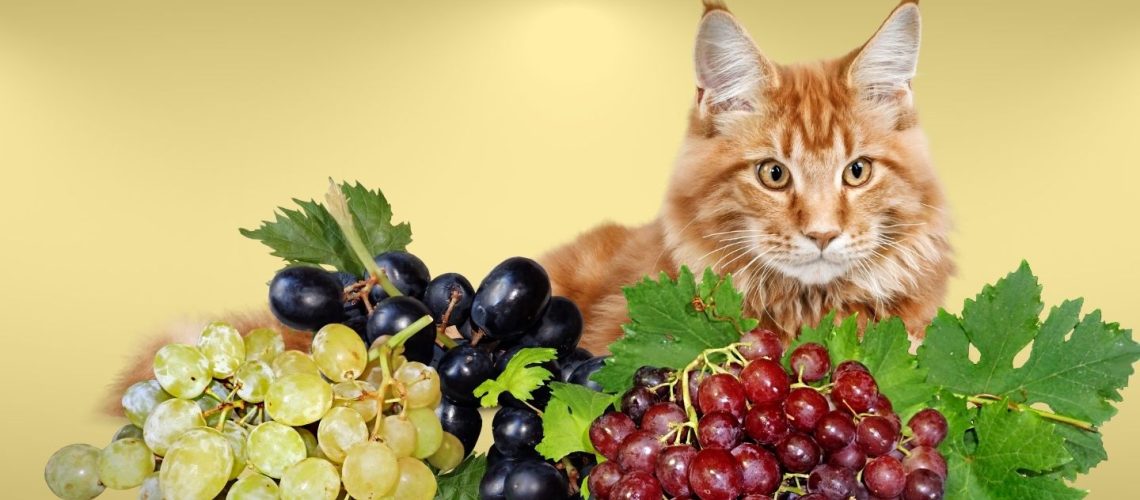No, cats should not eat grapes. Grapes and raisins have been known to cause kidney failure in cats. Even small amounts can be toxic and potentially lethal to cats. It's crucial to understand the importance of feline dietary restrictions and be aware of common human foods that may be dangerous for our feline friends.
What Makes Grapes Toxic to Cats?
The mystery behind grape toxicity in cats
The exact reason why grapes and raisins are toxic to cats is unknown. It is thought that a compound found in grapes and raisins can damage the kidneys, leading to sudden kidney failure.
Comparison to grape toxicity in dogs
Similar to cats, dogs are also susceptible to grape and raisin toxicity. Though the specific toxic compound remains unidentified, it poses a deadly threat to both cats and dogs.
Signs and Symptoms of Grape Toxicity in Cats
How to recognize symptoms in your cat
Symptoms of grape or raisin toxicity in cats can include vomiting, loss of appetite, lethargy, and an increased thirst. In severe cases, kidney failure can occur within just a few days of ingestion.
The progression of grape toxicity
As grape toxicity progresses, cats may become dehydrated, develop abdominal pain, and exhibit a decrease in urine production. If left untreated, the condition can lead to severe kidney damage and even death.
Treatment Options for Cats that Have Ingested Grapes
Importance of immediate veterinary attention
If you suspect that your cat has eaten grapes or raisins, it is important to contact your veterinarian immediately. Your veterinarian can assess the severity of the ingestion and recommend the best course of treatment.
Inducing vomiting and other treatments
In some cases, your veterinarian may induce vomiting to help remove the grapes from your cat's system. Other treatments may include administering activated charcoal, intravenous fluids, and medications to protect their kidneys.
Monitoring and follow-up care
After initial treatment, your veterinarian will likely monitor your cat closely and perform blood tests to assess kidney function. This will help determine if any long-term damage has occurred and if additional treatments are necessary.
Other Dangerous Foods for Cats
A list of foods to avoid
In addition to grapes, other dangerous foods for cats include chocolate, onions, garlic, alcohol, and caffeine. These foods can cause various health issues in cats, such as vomiting, diarrhea, and even organ failure.
The dangers of feeding cats human food
It's important to remember that, while some human foods are safe for cats in small quantities, many can be toxic or difficult for cats to digest.
Safe alternatives and treats for cats
Offering your cat specially designed, high-quality cat treats and pet-safe human foods, such as cooked meat and fish, in moderation can be a great way to pamper your pet without risking their health.
Tips for Keeping Cats Safe from Toxic Foods
Proper food storage
To prevent your cat from eating grapes or other toxic foods, store them securely in an area that is inaccessible to your cat. Keep dangerous foods off countertops and tables, and ensure that all food storage containers are sealed and secure.
Educating family members and guests
Inform family members and guests of the potential dangers associated with certain human foods and request that they avoid feeding your cat anything without your approval.
Creating a cat-safe environment
By supervising your cat both indoors and outdoors, and ensuring toxic items are safely contained and out of reach, you can create a safer environment for your beloved pet.
Frequently Asked Questions about Cats and Grapes
Can cats have grape juice or wine?
No, cats should not consume grape juice or wine. These products are made from grapes and can still contain toxic compounds that are dangerous to cats.
Are seedless grapes safe for cats?
No, seedless grapes still pose a risk to cats. The toxicity comes from the grape itself, not the seeds.
Can cats eat grape-flavored products?
While some grape-flavored products may not contain actual grapes, it's best to avoid feeding them to your cat. Many artificial flavors and additives may also be harmful to cats.
Conclusion
In conclusion, grapes and raisins are toxic to cats and can cause kidney failure. It is important to keep grapes and raisins out of reach of your cat, be aware of other dangerous foods, and to contact your veterinarian immediately if your cat ingests grapes or raisins. By taking these steps, you can help protect your cat's health and prevent potential complications. Ensuring your cat's safety and well-being is paramount, and early action can make all the difference in the overall outcome.











